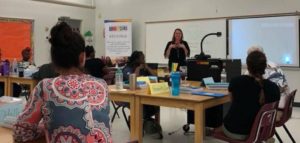
How will we prepare students to thrive in the future workplace? Many jobs that exist today will be gone, while new jobs requiring a different set of skills and competencies will emerge.
One foundational skill we can provide students now is a strong competency in mathematics. For continued economic growth in Florida, educators and employers agree: we must ensure there is a pipeline of career-ready STEM graduates.
“So many careers need that strong math background,” observed Laurie Burke, an assistant principal at Fleming Island High School.
But there’s a problem.
“Less than half of our high school students, only 42 percent, passed the Algebra I end of course exam in 2017,” said Kathleen Schofield, STEM2 Hub’s executive director.
The solution
The University of Arizona’s Intel Math Program is an 80-hour professional development course in mathematics content for K-8 teachers now offered by STEM2 Hub across Northeast Florida.
Tracey Kendrick, principal at Oakleaf Village Elementary School, knows there is a significant correlation between math competency in teachers and how they instill those skills in their students.
“What I find when I go into classrooms looking at math instruction is that I have quite a few elementary math teachers that do not fully understand the content. If you are relying on a textbook to teach you the math so that you can teach students, you are going to miss some key concepts. And I see this happening at about second grade,” she said.
Her observations bear out statistically: the average teacher score for math content knowledge through pre-algebra is 44 percent. There are simply not enough math teachers with the strong foundational skills needed to adequately prepare students.
“If you can fix the content knowledge in second grade on up, then you get much stronger math students, and students who don’t have a phobia or fear of math,” Kendrick said. “What we know is that if children do not learn how to do multiplication, their math scores start dropping off dramatically when you go into junior high and high school, because that’s really the foundation for upper level mathematics.”
Kendrick made it a priority for Oakleaf Village teachers to complete Intel Math training.
Teacher feedback
From Lisa Hurlock, a fourth-grade teacher at OVE: “Intel Math empowered the way that I teach. I knew exactly where they [students] were coming from, what they need to know going forward, and I think that all comes from having that in-depth training that says here’s your strengths, here’s your weaknesses. What are you good at? What can you improve on?”
From Valerie Knight, a fifth-grade teacher at OVE: “I feel like I have really deepened my understanding of math content, so it definitely boosted my confidence in math, and my understanding translated to the kids when they can tell their teacher is confident is math. When a teacher is confident in math, they’re going to be more enthusiastic.”
By making Intel Math training available to teachers across Northeast Florida, STEM2 Hub will improve instructional quality by addressing teacher content knowledge, directly influencing student outcomes.
By investing in our teachers, we can close student achievement gaps and generate a robust talent pool. Taking these steps now will prepare students in our region to become a future-ready workforce.
More reading
- Mathematical Knowledge for Teaching and the Mathematical Quality of Instruction: An Exploratory Study, Cognition and Instruction
- Rising to the Challenge: America’s Math and Science Curriculum Is Key to Future Competitiveness, Wall Street Journal
- Knowing Mathematics for Teaching: Who Knows Mathematics Well Enough to Teach Third Grade, and How Can We Decide?, University of Michigan Library
- What’s Past is Prologue: Relations Between Early Mathematics Knowledge and High School Achievement, National Center for Biotechnology Information, U.S. National Library of Medicine